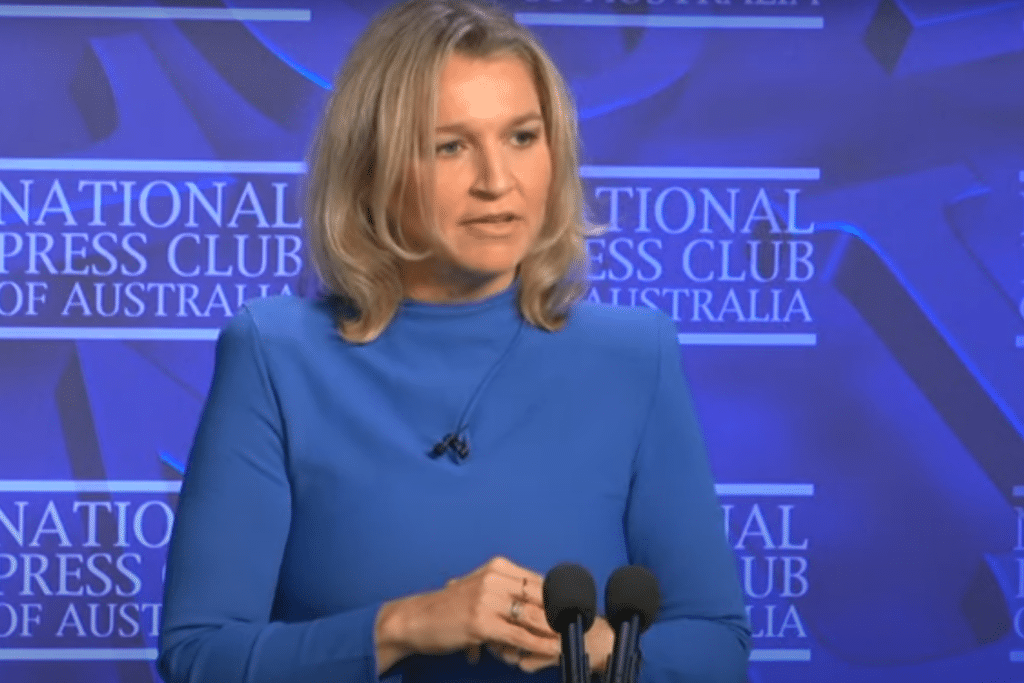The federal government should anticipate rising rates of family violence and its impacts on children and the labour market when it hands down the upcoming 2024-25 budget, economist Dr Angela Jackson said on Wednesday.
Speaking at the National Press Club, Jackson argued the government should mitigate the impacts of family violence in its budget through policies that focus on economic inclusion.
She spoke alongside Chief Economist of Westpac’s business bank Besa Deda and New Grattan Institute Chief Executive, Aruna Sathanapally.
“Here in Australia, we have faced what has been a very difficult year with the defeat of the Voice referendum, a housing shortage putting the housing market in a significant crisis and a disturbing increase in gender based violence,” Jackson said.
“Usually a per capita recession, rising unemployment and an imminent election would mean a big spending, everyone wins budget. Such an approach this year would only fuel inflation and make the job of the Reserve Bank even harder. It’s simply not possible this year.”
“This does not mean a budget that ignores gender-based violence or entrenched disadvantage or cost of living pressures. Quite the opposite.”
Jackson said the budget should focus on measures that increase the economy’s productive capacity, which means embedding economic inclusion.
“Economic inclusion involves ensuring every member of society is supported to first fully participate in our economy to reach their untapped potential,” she said.
“Whether it’s women not supported to participate in paid work, children of income support recipients not supported to attend early childhood education and care, or the unemployed not supported to re-engage in education and employment.
“These all result in lower levels of participation and productivity. This really reduces the level of economic growth we can sustain over time and ultimately lowers living standards for all of us.”
Jackson said family violence is known to increase when households are under financial stress, and the federal government has a role to play in limiting the economic costs of family violence on women.
“Escaping family violence too often means experiencing homelessness, poverty and financial insecurity,” she said.
Jackson welcomed the federal government’s $925 million commitment to make permanent the Leaving Violence program, as well as last year’s reforms to the single parenting payment. She called for an increase to income support payments, including JobSeeker, to address the underlying impacts of poverty on single parents and those who have escaped family violence.
“We also see too often women who are escaping violence and specialist homelessness services are the biggest client seeking assistance and without adequate housing options they are regularly forced to choose between returning to a violent partner and homelessness,” she said.
“There are undoubtedly many Australians right now paying the price for our broken housing system, but none more so than women and their children that have experienced family violence.”
Jackson also pushed for better access to early childhood education and care, improving wages in the childcare sector and abolishing the activity test.
A wretched generational bargain
New Grattan Institute chief executive, Aruna Sathanapally, spoke about the “wretched generational bargain” facing Australia and the hard decisions we face, especially around tax reform and housing.
“Young people today face the prospect of weaker wages growth, higher hurdles to owning a home or more likely, a lifetime of renting, and a future increasingly shaped by extreme weather and natural disasters,” she said.
“We ask our young people, our children and grandchildren to contribute more towards supporting older generations than our older generations ever contributed when they were working age.”
Sathanapally said she believed Australians “are ready and willing” to have difficult conversations if they’re given the facts and the evidence.
“Indeed, Grattan Institute has previously argued that the public are more open to tough conversations on tax than the media is,” she said.
“We’re also seeing the willingness now to talk seriously about the fact that our planning system is creating profound housing inequities in our cities. But we shouldn’t need things to reach a breaking point before we have these conversations.”
Chief Economist of Westpac’s business bank Besa Deda also welcomed the government’s new spending on domestic violence. She noted any spending measures in the budget should be highly targeted and that bold reform on housing was necessary. She noted the rising wealth inequality in Australia, and the rising rate of homelessnesss.
“There is a housing shortage. There is strong population growth, building approvals that trending down, residential construction is softening and it’s hard to see that housing shortage going away anytime soon. It does require a multi pronged long term approach to address,” she said.


